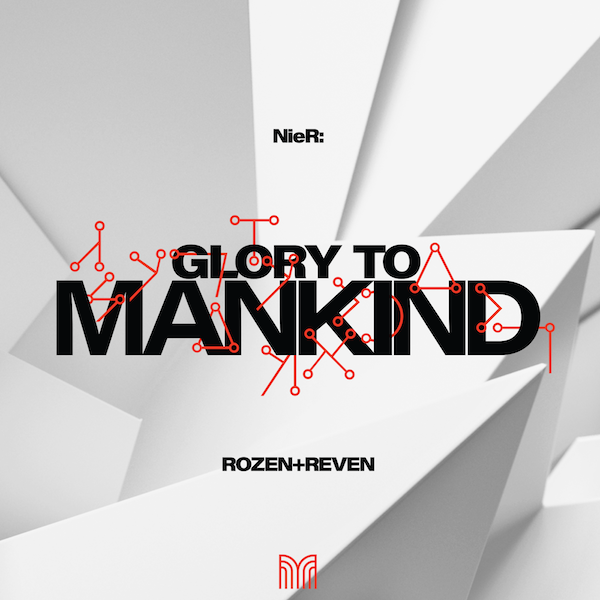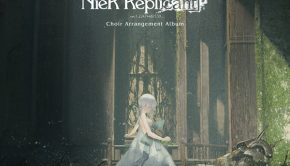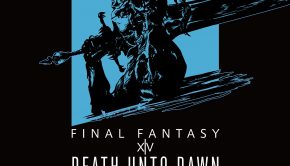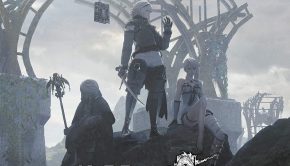NieR: Glory to Mankind
 |
Album Title: NieR: Glory to Mankind |
| Record Label: Materia Collective |
|
| Catalog No.: MCOL-0032 |
|
| Release Date: September 1, 2017 |
|
| Purchase: Buy at Bandcamp |
Overview
NieR: Glory to Mankind is an unofficial arrangement album by Rozen + Reven for NieR: Automata, and it is their first full-length project as a duo, covering most of the key themes from the game. For the most part they arrange the tracks in a way that is very much in keeping with the sound of the original game, mainly adding new synth and orchestral elements, though there are substantial changes in the dynamics of some the tracks and musical variations on others. Although the album was released before any of the official arrangement and orchestral albums for the game, it is interesting now to revisit this album and appreciate it for doing some things that the official albums did not venture to do.
Body
The album begins with “Become as Gods”, which serves as an atmospheric introduction, steadily building up electro-orchestral elements to the intensity of the original “Birth of a Wish”, though only for a brief time. It isn’t as thunderous as the original, but that is just fine, given its purpose here to serve as a taster of what can be expected over the course of the album, and for that it is quite effective. Other reworked battle tracks include “Eve”, which is from “Dependent Weakling”. This is much closer to its original, though it spreads out its individual elements and builds them up more gradually in order to give the track clearer development. There are also a few additions like the harpsichord, but what I appreciate most is the midsection reduction, which gives the track an emotional core and keeps it from being as monotonous as the original. The late key changes are very welcome too. Then there is “A Beautiful Song”, which wisely takes the route of stripping the track back, with just a few bursts of energy for punctuation. This helps set it apart from not only the original, but also from all of the official arrangements that have since followed and which aimed to recreate the intensity of the original. Reven is particularly impressive here, having the unenviable job of emulating Emi Evans, J’Nique Nicole, and the original choir. She may not reach their heights, but she does more than well enough for the track, and it makes for a wonderful companion to the excellent original.
Aside from these battle tracks, there are also some area themes. “City Ruins” takes on a more serious tone with lots of punchy string patterns and heavier atmosphere. The track crescendoes and then surprisingly lets out its tension with a brief reharmonization that is quite beautiful. Reven also does great on this track, and the vocal production is perfect for it. “Amusement Park” is very similar to the original in instrumentation, but it changes up most of its accompanying figures to be much more agitated, particularly with the strings. At times the track is calm and tranquil, but only as an eye in a manic and tempestuous storm. It manages to rival the original, successfully capturing a side of the setting that wasn’t entirely present in that original soundtrack version. The arrangement for “Copied City” is also quite good, adding a few instruments throughout to emphasize acoustic and orchestral textures while staying close to the original in tone, which is a good choice given how unique the original felt. The main draws of the arrangement are the improvised piano segments throughout the track, which can be quite impressive and dazzling, and break up the track without detracting from the overall momentum.
In terms of quieter moments, the album has a few offerings. “Wretched Weaponry” straddles itself between the two poles of the original soundtrack versions, not too empty but certainly on the more somber side. As the arrangement progresses, it becomes more and more haunting as soft echoes and drawn out notes by Reven float about. It was overlooked on other arrangement albums, so I’m quite happy to see it get attention here. “Vague Hope”, another of my favourites from the original, isn’t as successful. The strings-heavy arrangement doesn’t sound convincing enough, having only a live cello and taking the rest from sound libraries, which simply don’t pull off the emotion needed for the track. Rozen here does the vocal, but his voice is too soft and the melody is pitched too low for him to stand out enough above the strings. But even overlooking these sound issues, the arrangement itself is not as ambitious or interesting as others on the album. “Weight of the World” suffers from the similar problems, though it has more going for it. The arrangement is more dramatic and varied than the original’s, but again the synth orchestra isn’t quite dynamic enough to support it. Here Rozen and Reven sing together with new Spanish lyrics, and while they produce some nice harmonies for the chorus, it’s not enough to bring me back to the track often.
The last tracks to be discussed all originated in NieR Gestalt and Replicant, though of course the arrangements here take after their NieR: Automata counterparts. The first of these is “Emil (Despair)”, which is perhaps my favourite version of the track. The arrangement changes up the instrumentation and accompaniment quite a bit, being a hybrid of synth and orchestral elements. The track develops wonderfully, frequently shifting the textures while retaining the emotion. Although it never fully unleashes either, it still is very intense throughout, and Reven’s vocals contribute much to this. “Song of Devola and Popola” begins fairly conventionally, being on the more atmospheric side with piano and strings, but then it really gets interesting when the arrangement switches to 3/4 time. It takes some getting used to, and there are a few beats that feel a tad awkward, but it’s a great way to put a unique spin on a track that already has so many other versions, and overall it works really well. The backing instrumental is also excellent, particularly when the exotic percussion joins in. On the heavier side of things is “Dark Colossus”, which features instrumentation very close to the original, even including an organ solo just as its soundtrack counterpart does. The arrangement does a better job of developing dynamically, and there is more energy during the organ solo and at the track’s peaks, but it does stay a bit too close to the sound of the original. “Grandma (Destruction)” is similar in those respects, having a more narrative progression than the original and well-placed moments of reprieve. The addition of the organ here is great, and I’m very impressed at how Rozen and Reven sound as a choir. I wish it diverged more in sound from the original, but it’s a great version of the track nonetheless.
Summary
NieR: Glory to Mankind is a solid arrangement album for an excellent soundtrack, staying true to the originals in overall sound while bringing out new aspects, so that much of the album sounds like it could be an extension of the original soundtrack. Some tracks are just small improvements on the originals, while others more drastically change the dynamics or atmosphere. Only a few tracks do not work well or do not differentiate themselves enough from the originals. The instrumentation and sound quality of the album is generally quite good, and Reven in particular does an impressive job of emulating so many styles of singing, helped by excellent mixing. A couple of these arrangements, in particular “A Beautiful Song” and “A Song of Devola and Popola”, manage to stand out even now after so many official arrangement albums since they are handled in such different ways. Fans of the series that are still craving more NieR music should find enough on this album to enjoy.
Do you agree with the review and score? Let us know in the comments below!
3.5
Posted on May 7, 2020 by Tien Hoang. Last modified on May 7, 2020.














